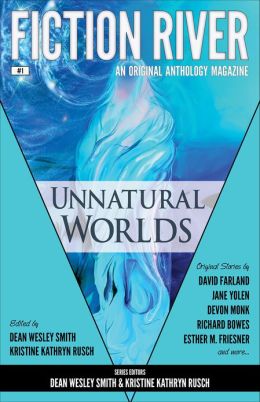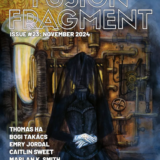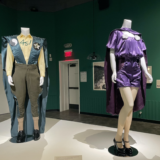 Fiction River
Fiction River
WMG Publishing
Six times a year
Electronic $6.99
Trade Paper $15.99
I interviewed Kristine Kathryn Rusch two weeks ago about the experience of launching Fiction River via Kickstarter. Fiction River is a new anthology series billed as an “anthology magazine” by the publisher, WMG Publishing. The current publishing schedule is every other month, with each month’s installment having a different theme. The first volume is entitled Unnatural Worlds, and contains stories from many different subgenres of fantasy. Future volumes have titles such as Christmas Ghosts, Timestreams, How to Save the World, and there’s a special volume entitled Crime.
My copy didn’t arrive soon enough for me to read and review the first volume in time for last week’s post, much to my consternation. So, somewhat belatedly, here is what I thought of the first issue of Fiction River.
First, the selections in this inaugural volume are more diverse than you find in most anthologies. Diverse enough that nearly everyone will find several stories they like, but also diverse enough that it’s a safe bet many readers will find at least one story that isn’t to their liking. That last statement shouldn’t be taken as a negative. A good editor (and Rusch and Smith are award winning editors) needs to appeal to the widest possible readership. That’s what the editors have done here.
All the stories are well written, with the writing of the highest professional quality. Hardly surprising since inclusion in Fiction River is by invitation only. These are people who know what they’re doing. And it shows.
Here’s a quick rundown of the contents. Smith and Rusch both contribute a foreword and an introduction, respectively, giving some background on what led them to start this series. Then it’s on to the stories.
First up, Devon Monk gives us a tale of dimension shifting heroes who fight monsters in “Life Between Dreams”. This one isn’t part of any series, although I can see it becoming the first of a series. “Finally Family” by Ray Vukcevich is a slipstream-like story with echoes of Kafka about finding family in the remotest places. Vukcevich’s work is something of an acquired taste, and until now what little I’d read by him hadn’t done much for me. With this one, I’m starting to understand what people see in him. I liked the way this one brought several threads together in the end.
We shift gears with Esther Friesner, in a tale of Victorian England, when a young girl has to deal with “The Grasshoppers and my Aunts”. I liked the humor in this one, and Freisner captures the tone of the period quite well with her portrayal of the straight-laced aunts, who are more than they appear to be.
Irette Y. Patterson provides a romantic fantasy about how to capture a man’s heart in “True Calling”. While not my (if you’ll pardon the pun) slice of cake, I can see how this one will appeal to a large segment of the intended audience. This is Ms. Patterson’s debut story, and I suspect it won’t be the last story she publishes. For a first story, it didn’t read like it was.
Kellen Knolan also provides a debut story with “A Taste of Joie De Vivre”, but his is YA. It concerns the girl who wears the mascot costume for a small Louisiana high school. Things have changed in the town of Nexus since its heyday in the 20th century, but things are about to change back. And the mascot finds out she has a role to play in the events. Another strong debut, and another writer whose name I expect to see appearing in other venues in the future.

We shift gears again with Annie Reed. Her latest installment of the fantasy detectives Diz and Dee is “Here, Kitty Kitty”, in which the detective duo attend an anime convention. There’s a lot of fun tongue in cheek with this one.
Dean Wesley Smith and Kristine Kathryn Rusch each contribute a story. Smith’s is an adventure of his superhero Poker Boy. If you’ve not read these, then you need to, and this is a good place to start. Poker Boy works for Stan, the God of Poker, who in turn works for Lady Luck. He’s dating Front Desk Girl. He usually has to save the world, or in some cases, the universe. This series is unlike anything else out there. It’s quirky and a lot of fun. There’s a Poker Boy novel in the works, and that’s a good thing.
Rusch’s story is “Shadow Side”. I’m not sure if this one is part of a series or not. It reads like it could be, albeit a series moving in a new direction. Either that or the first installment in a new series. If the former, it’s one I want in which to read the preceding stories. This one concerns a law enforcement official who interviews for a new job. He just wants to find a place where the crimes don’t involve the supernatural. Unfortunately, his experience with the supernatural is exactly why he’s being interviewed.
Leah cutter takes us to China, for a moving story of “Sisters”, in which the surviving sister tries to find a husband for her deceased sister in the afterlife. This is hard because everyone refuses to acknowledge the existence of the deceased sister.
Richard Bowes departs from his typical New York setting to visit “The Witches House”, a riff on fairy tale motifs. Bowes is a consummate stylist, and he doesn’t disappoint here.
The mark of a good writer is one who can move the reader and whose work stays with the reader long after the last page is turned. Jane Yolen is more than capable of reaching this level of the craft, and she’s at the top of her game in “Dog Boy Remembers”, an extremely dark look at what can happen when the worlds of men and fey intersect. I found this one to be the most disturbing story in the book by far. I suspect most parents would as well. It’s also the one that has my vote for most likely to be on an award ballot and/or included in a Year’s Best annual anthology next year.
Finally, David Farland provides a prequel to his popular Runelords series of epic fantasy in “Barbarians”. I read the first of the Runelords a number of years ago, enjoyed it, but never picked up the others, primarily due to time constraints and length considerations. I’m considering giving the series another try.
Like I stated earlier, a very diverse selection. I most enjoyed the Monk, Freisner, Smith, Rusch, and Farland stories, with the Yolen story, while not what I would call enjoyable, leaving one of the deepest impressions. A few of the other stories weren’t the sort of thing I would normally read, but of those only one bored me. The rest at the very least held my interest and were enjoyable.
I read an electronic edition. The production values were top notch. I found no typos, nor were there any problems with the copyediting. The interactive table of contents worked the way it was supposed to. Never once was I taken to someplace other than where I was supposed to go when I clicked those links. A truly professional job, better than what I’ve seen from many major publishing houses.
So, to sum up. From a personal standpoint, I more than got my money’s worth. I don’t pick up an anthology expecting to like every story in it unless the focus is pretty narrow or it falls in one of a few specific subgenres. I do expect to find a mix of familiar and new types of story. Fiction River delivered.
Fiction River is off to an auspicious start. It’s a worthy heir to the original anthology series of the 60s and 70s. If Rusch, Smith, and their guest editors maintain this level of quality, this will one day be one of the landmark anthology series of the genre. The fact that they also intend to include other genres, such as mystery and crime, imply these anthologies could have a greater impact. It’s certainly the top anthology of the year to date. While I don’t pretend to be aware of everything that is published, so far I haven’t seen much competition.











1 Comment